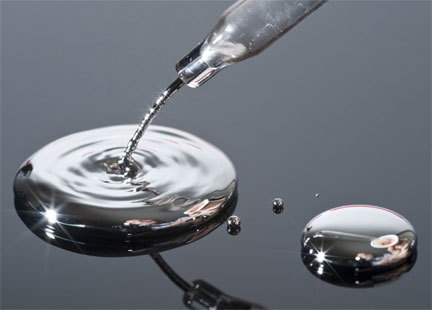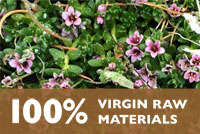Floorcovering Selections -
Poison Optional (Download the PDF)

The Problem
Heavy metals such as Cadmium, Lead, Mercury, Chromium and others are accepted by scientists as being toxic and harmful to health. As well as occurring naturally in the environment, two of the industrial uses of heavy metals include their use as stabilizers and pigments in the manufacture of some vinyl products. They are used because they are a lower cost option and perform well in various manufacturing processes. As awareness about the harmful effects of heavy metals has increased, their use has been reduced.
How do METALS get into flooring?
Heavy metals still end up in many luxury vinyl wood plank and tile (LVT) products purchased by consumers. Some manufacturers incorporate high levels of post consumer recycled vinyl (50% - 75% of the product) into the backing layer of their product and promote this as an environmental benefit to specifiers. What those specifiers are not told is that the recycled material is of unknown origin and that it often contains poisonous heavy metals. The real reason manufacturers use post consumer recycled material is because it costs about half as much as the higher quality virgin vinyl.
Traverse recycles production scrap internally (post industrial recycled content recycled within Traverse own manufacturing process - i.e. materials of known origin) but uses ZERO post consumer recycled material in production of our Boardwalk, Obelisk, Homewoods and Timeless Hand Scraped ranges. Traverse uses virgin/first use raw materials only, so the precise formulation of the product is known.
 Traverse
is in favor of envrironmentally sound recycling because the
environmental benefits of recycling many products are abundantly clear.
In the case of vinyl flooring products however, there are negative
consequences resulting from the use of recycled material with no
benefits other than a lower production cost for manufacturers and a
perceived benefit in the marketplace that the word "recycled" means that
a product is environmentally friendly. When we dig deeper, recycled can
no longer be labeled "green" if the resulting product contains higher
levels of toxins.
Traverse
is in favor of envrironmentally sound recycling because the
environmental benefits of recycling many products are abundantly clear.
In the case of vinyl flooring products however, there are negative
consequences resulting from the use of recycled material with no
benefits other than a lower production cost for manufacturers and a
perceived benefit in the marketplace that the word "recycled" means that
a product is environmentally friendly. When we dig deeper, recycled can
no longer be labeled "green" if the resulting product contains higher
levels of toxins.

 Test RESULTS
Test RESULTS Luxury
vinyl woodplank and tile is a product category with fantastic design
possibilities and far superior overall performance for commercial uses
than the natural materials the product replicates. At Traverse we have
worked hard to separate ourselves from other flooring ranges in terms of
visual appeal.
Luxury
vinyl woodplank and tile is a product category with fantastic design
possibilities and far superior overall performance for commercial uses
than the natural materials the product replicates. At Traverse we have
worked hard to separate ourselves from other flooring ranges in terms of
visual appeal.